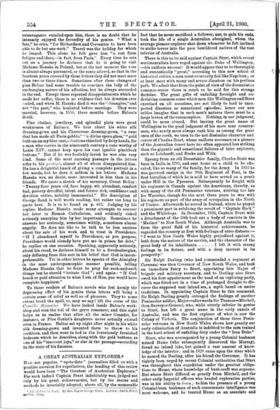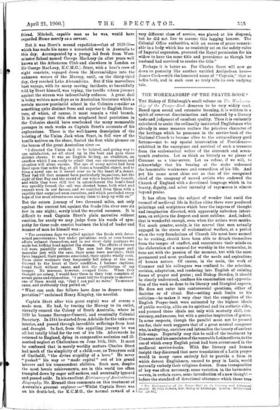• A GREAT AUSTRALIAN EXPLORER.*
HAD not popular, " up-to-date " journalism filled us with a positive aversion for superlatives, the heading of this review would have been "The Greatest of Australian Explorers." For such indeed Captain Sturt indubitably was, judged not only by his great achievements, but by the means and methods he invariably adopted; above all, by the memorable Jr a C4rt art. By Mrs. SAVer George Start. London: SmRh, Elder,
and c.„
fact that he never sacrificed a follower, nor, to gain his ends, took the life of a single Australian aboriginal, whom the average pioneer-explorer shot down whenever he felt inclined to strike terror into the poor bewildered natives ot the vast interior of Australia.
There is this to be said against Captain Stnrt, which recent sentimentalists have urged against the Duke of Wellington, —his uniform success ! It would appear that to be thoroughly and romantically "great," according to this new school of historical critics, a man must eventually fail like Napoleon ; or at least meet with many and severe disasters on his perilous path. We admit that from the point of view of the dramatist or romance-writer there is mach to be said for this strange doctrine. The great gifts of unfailing foresight and un- deviating common-sense which men like Wellington and Start exercised on all occasions, are not likely to lead to unex- pected disasters or sensational episodes ; hence our new critics imagine that in such men's natures there mast be a large leaven of the commonplace. Nothing, in our judgment, could be more absurd. But leaving the great name of Wellington to the good judgment of his more sane country- men, who surely must always rank him as among the great ones of the earth, we tarn to the not dissimilar character and career of Charles Start, whose uniform successes as a pioneer of the Australian desert have toa often appeared less striking than the gigantic and sensational failures of later eiplorers, such as Leichardt, and Burke and Wills.
Sprung from an old Dorsetshire family, Charles Start was born in India in 179:3, and sent home as a child to be edu- cated, like so many of the family, for the Army. In 1813 he was gazetted ensign in the 39th Regiment of Foot, in the first battalion of which he is said to have served as a youth under Hill in the Pyrenees. Subsequently he fought with his regiment in Canada against the Americans, thereby, as with many of the old Peninsular veterans, arriving too late for Waterloo, though for the next three years be was with his regiment as part of the army of occupation in the North of France. Afterwards he served in Ireland, where he played a prominent part in subduing the revolt of "Captain Rock" and the Whiteboys. In December, 1826, Captain Sturt with a detachment of the 39th took out a body of convicts in the 'Mariner' to New South Wales. Although Australia was to form the great field of his historical achievements, he regarded the country at first with feelings of utter distaste :— " I went to New Smith Wales highly prejudiced against it, both from the nature of the service, and the character of the
great body of its inhabitants I left it with strong feelings in its favour, and with a deep interest in its prosperity."
Sir Ralph Darling (who had commanded a regiment at Cornnna) was then Governor of New South Wales, and took an immediate fancy to Start, appointing him Major of brigade and military secretary, and to Darling also Start owed his first appointment as the head of an exploring party, which was fitted out in a time of prolonged drought to dis- cover the supposed vast inland sea, a myth based on native traditions. In appointing Captain Start to this command, Sir Ralph Darling greatly outraged the feelings of another Peninsular soldier, Major—afterwards Sir Thomas—Mitchell, then Surveyor-General, who, while utterly inferior -in genius to Start, has left a great name in the early annals of Australia, and was the first explorer of what is now the Colony of Victoria. The conjunction of these three Penin- sular veterans in New South Wales shows how greatly our early coronisation of Australia is indebted to the men trained in the hard school of unfailing duty under the "Iron Duke."
Start, who was accompanied by a young Colonial bushman na'med Hume (who subsequently discovered the Murray), found no inland lake, but gained a vast amount of know- ledge of the interior ; and in 1829 came upon the river which he named the Darling, after his friend the Governor. It has rightly been urged by recent Colonial authorities that Start was throughout this expedition under the greatest obliga- tions to Hume, whose knowledge of bush-craft was supreme. But where Start differed so greatly from Mitchell, and the other early Imperial officers who headed exploration parties, was in his ability to learn ; to him the presence of a young Colonial-born bushman of such consummate intelligence was most welcome, and he treated Hume as an associate and
friend. Mitchell, capable man as he was, would have regarded Hume merely as a servant.
But it was Sturt's second expedition—that of 1829-30— which has made his name a household word in Australia to this day. Accompanied by a young lad fresh from West- minster School named George MacLeay (in after years well known at the Athennum Club and elsewhere in London as Sir George MacLeay, Sturt, with a boat's crew of eight convicts, voyaged down the Murrnmbidgee into the unknown waters of the Murray, until, on the thirty-third day, they reached Lake Alexandrine. But if this marvellous
boat voyage, with its many moving incidents, so beautifully told by Sturt himself, was trying, the terrific return journey
against the stream was indescribably arduous. A great deal is being written nowadays as to Australian literature which a certain narrow provincial school in the Colonies consider as something quite distinct from and superior to English litera- ture, of which, of course, it must remain a vital branch. It is strange that this often misplaced local patriotism in the Colonies should have overlooked the many memorable passages in such works as Captain Sturt's accounts of his explorations. There is the well-known description of the hoisting of the Union Jack when Sturt, in full view of the hostile natives on the shore, floated the first white pioneer on the bosom of the great Australian river :—
" I directed the Union Jack to be hoisted, and giving way to our satisfaction, we all stood up in the boat and gave three distinct cheers. It was an English feeling, an ebullition, an overflow which I am ready to admit that our circumstances and situation will alone excuse. The eye of every native had been fixed upon that noble flag, at all times a beautiful object, and to them a novel one as it waved over us in the heart of a desert. They had till that moment been particularly loquacious, but the sight of that flag and the sound of our voices hushed the tumult, and while they were still lost in astonishment the boat's head was speedily turned, the sail was sheeted home, both wind and current were in our favour, and we vanished from them with a rapidity that surprised even ourselves, and which precluded every hope of the most adventurous among them to keep up with us."
But the return journey of two thousand miles, not only
against the current but against the floods (the river rose six feet in one night), sorely tried the wearied oarsmen. It is difficult to read Captain Sturt's plain narrative without emotion, for surely we may judge from his words of sym- pathy for these rude convict boatmen the kind of leader and manner of man he himself was
For seventeen days we pulled against the floods with deter- mined perseverance ; but under privations such as ours human efforts exhaust themselves, and in our short daily journeys we made but trifling head against the stream. The effects of severe toil were painfully evident. The men lost the proper and muscular jerk with the oars, their arms were nerveless, their faces haggard, their persons emaciated, their spirits wholly sunk. From sheer weakness they frequently fell asleep at the oar. Grieved to the heart at their condition, I became captious, fontid fault without cause, and lost the equilibrium of my temper. No murmur, however, escaped them. When they thought me asleep, I would hear them in their tent complain of severe pains and exhaustion. I must tell the Captain to-morrow,' one of them would say, that I can pull no more.' To-morrow came, and stubbornly they pulled on."
What can such fine fellows have done to deserve trans- portation?" exclaimed Henry Kingsley, the novelist.
Captain Sturt after this great exploit was of course a made man. He had, by tracing the Murray to its outlet, virtually created the Colony of South Australia, where in 1839 he became Surveyor-General, and eventually Colonial Secretary. In 1844 he started from Adelaide for the unknown interior, and passed through incredible sufferings from heat and drought. In fact, from this appalling journey he was all but totally blind for the rest of his life. Afterwards he returned to England, dying in comparative seclusion and ill- merited neglect at Cheltenham on June 16th, 1869. It must be confessed that in merely worldly matters Charles Stud had much of tile simplicity of a child,—or u Tennyson said of Garibaldi, "the divine stupidity of a hero." He never " pushed " his way or "made capital" out of his grand labours and his transcendent abilities. Such men, despite the most heroic achievements, are in this world too often trampled down by eager self-seekers, and eventually ignored
and passed aside. In his excellent Dictionary of Australasian Biography, Mr. Mennen thus comments on this treatment of Australia's greatest explorer :—"Whilst Captain Sturt was
on his death-bed, the K.C.H.G., the normal reward of a
very different class of service, was placed at his disposal, but he did not live to assume this lagging honour. The Colonial Office authorities, with an excess of grace remark- able in a body which has so resolutely sat on the safety-valve of Imperial expansion, procured the Royal permission for his widow to have the same title and precedence as though her husband had survived to receive the title."
Perhaps it is better so. For Charles Sturt will now go down to posterity like another untitled Antipodean hero— James Cook—with the honoured name of "Captain," that so befits both, and in each case so truly tells its own undying tale.



































 Previous page
Previous page